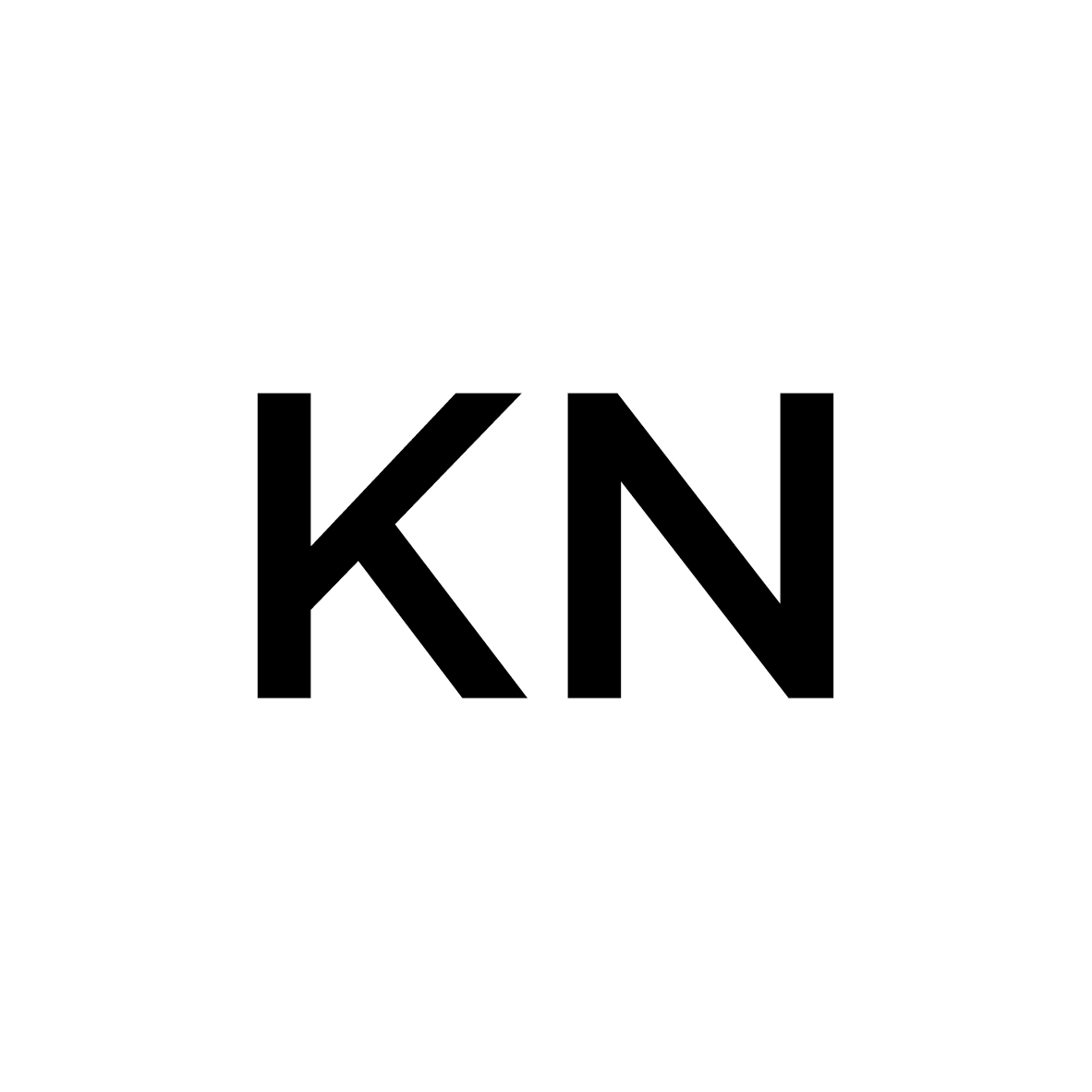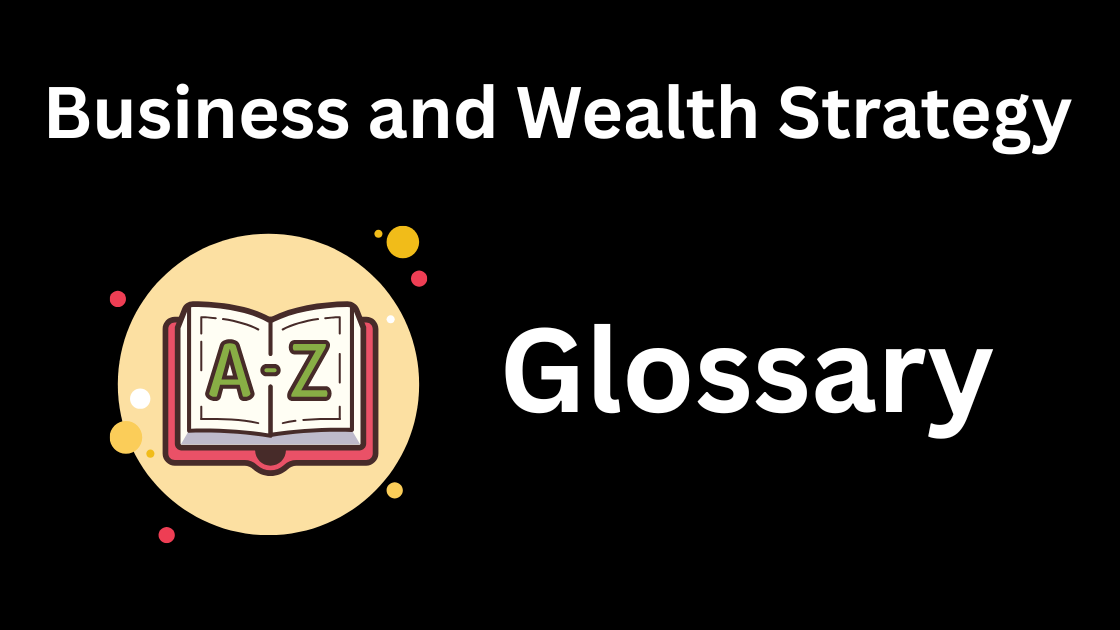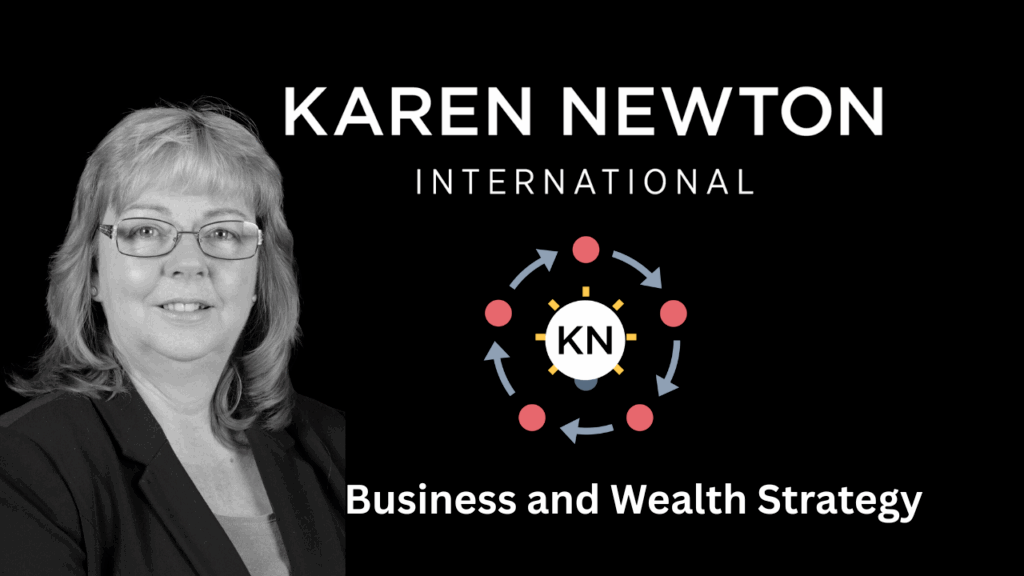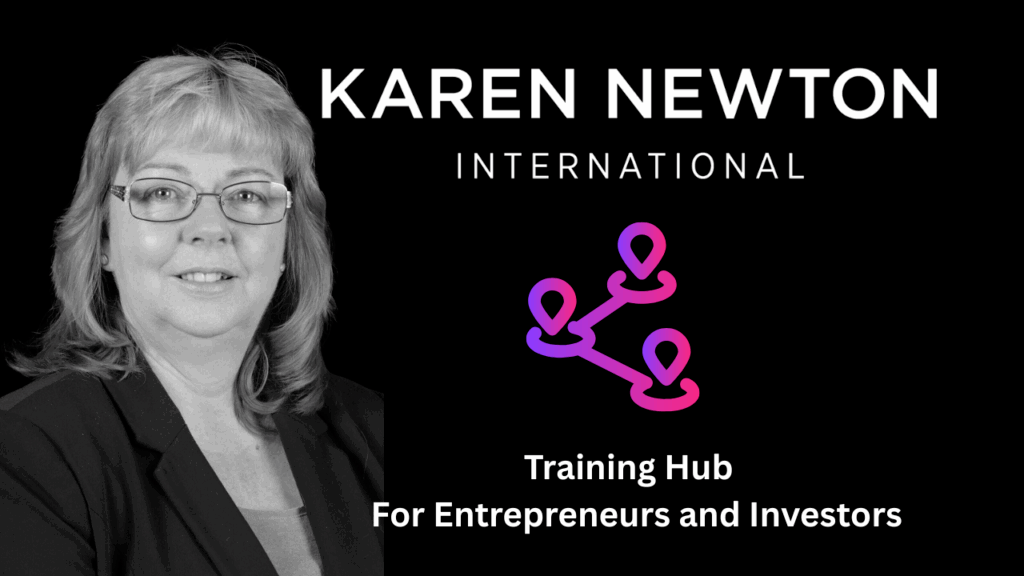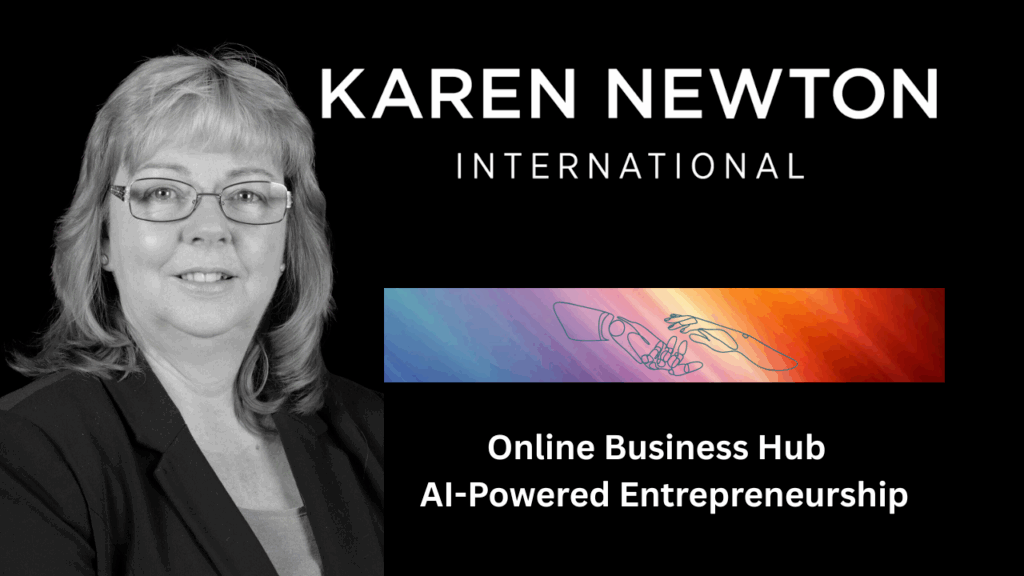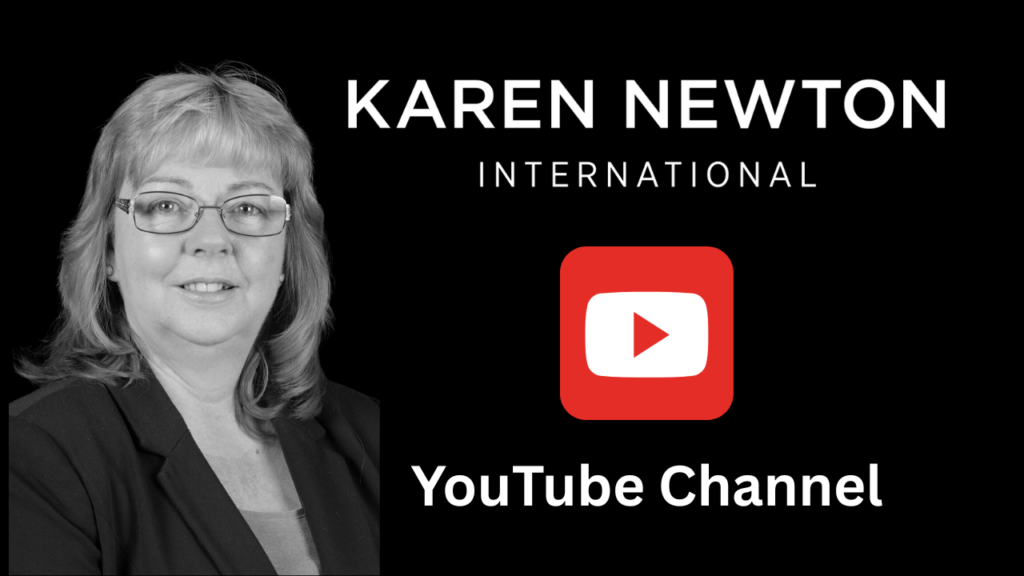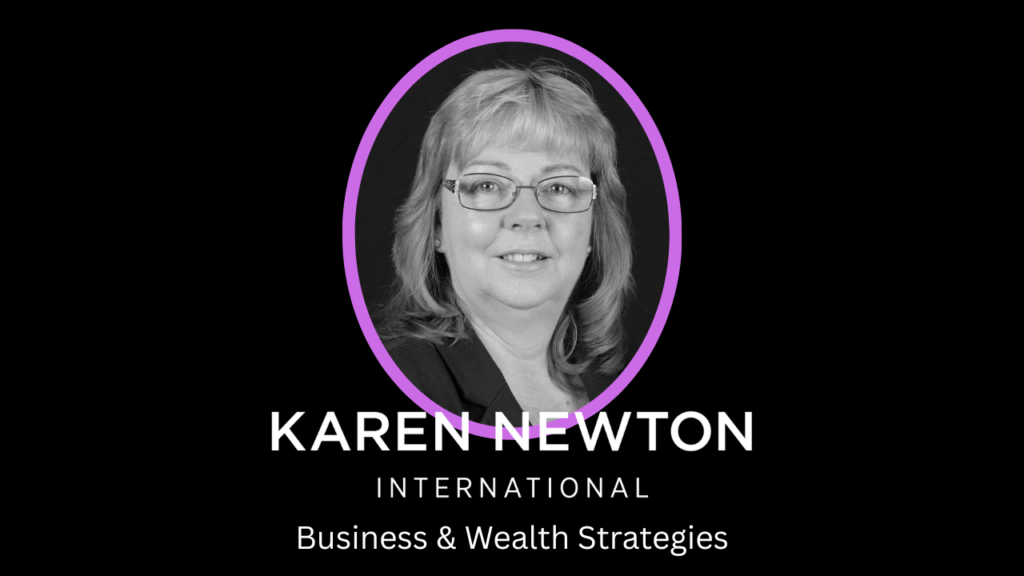Welcome to the Glossary
This page defines key business, marketing, and investment terms used across Karen Newton International. Whether you’re just starting out or refining your strategy, this glossary of quick explanations will help you move forward with clarity and understanding.
A
- Affiliate Marketing
- A business model where you earn a commission by promoting other people’s or company’s products. You don’t create the product — you simply refer customers using a special tracking link.
- AI Forecasting
- The use of artificial intelligence to analyse data patterns and predict future trends — such as economic growth, inflation, or stock performance — with greater accuracy.
- AI Income Streams
- Income sources created, supported, or automated by artificial intelligence. Examples include automated content creation, digital products, blogs, affiliate marketing, and online businesses. AI allows one idea to generate multiple income streams with less manual effort.
- AI-Powered Entrepreneurship
- The process of building and running an online business using artificial intelligence tools for market research, automation, content creation, and customer engagement — allowing faster and more efficient business setup.
- AI-Powered Micro Business
- A small business operated by one person using AI tools to automate tasks, create digital products, streamline operations, and scale income with minimal overheads.
- Ani
- An AI-powered niche finder developed by Karen Newton International. Ani helps entrepreneurs discover profitable niche markets based on interests, keywords, and demand — fast and free in memberships and selected courses
- Appropriations Bill
- A government proposal that authorises spending for specific departments and programs. If these bills aren’t approved on time, parts of government operations may shut down.
- Arbitrage
- Arbitrage refers to creating value by taking advantage of price or valuation differences for the same asset across different markets or financial structures, without relying on market direction.
- Asset
- Something that puts money in your pocket, such as shares, property, or a business. Assets generate income or grow in value over time.
- Asset Allocation
- Asset allocation is the process of deciding how to spread money across different asset types such as cash, shares, property, and commodities. A balanced allocation helps manage risk and smooth returns over time.
- Asset Classes
- Categories of investments with similar characteristics. Common classes include equities (shares), property, commodities (like gold/silver), cash, and digital assets like cryptocurrency.
- Asset-Backed Security (ABS)
- An investment product made by bundling loans such as car finance, credit cards, or mortgages into tradeable securities. Investors earn income from the repayments, but rising defaults can quickly reduce their value.
B
- Bank Deposit Guarantee
- A legal safeguard that protects depositors if a bank fails. In 2024, the Bank of England raised the guarantee from £85,000 to £110,000 per person, reflecting growing concern over financial stability.
- Be Your Own Bank
- A wealth-building principle based on using the same methods banks use: keeping cash flow active, reinvesting profits, and maintaining control over money decisions. The goal is to create personal financial independence rather than rely on external institutions.
- Be Your Own Economy
- Karen Newton’s philosophy that financial security comes from self-created income streams – not reliance on employers, markets, or governments. It means building multiple income sources that sustain your lifestyle regardless of external conditions.
- Behavioural Risk
- Behavioural risk is the risk of making poor investment decisions due to emotions such as fear, panic, or greed. This is one of the most common reasons investors underperform over time.
- Bond Markets
- The financial marketplace where debt securities such as government and corporate bonds are issued and traded. It includes both the primary market (new issues) and the secondary market (trading existing bonds)
- Bond Yield
- The return an investor receives from holding a bond, expressed as a percentage of the bond’s price. Yields rise when bond prices fall, often due to inflation fears or rising interest rates.
- Boom and Bust Cycle
- The repeated pattern of economic expansion (boom) and contraction (bust) that shapes markets, business growth, and investment returns.
- Bootstrapping
- Starting a business with minimal external funding by relying on personal savings or revenue.
- Budget Deficit
- The gap between what the government spends and what it earns in taxes and revenue. A deficit means more borrowing is required.
- Bullion
- Physical precious metals such as gold and silver, typically in bar or coin form, used as a hedge against inflation and economic uncertainty.
- Business Closures
- When companies shut down permanently due to financial strain, often accelerated during recessions.
C
- Capital Growth
- Capital growth is the increase in the value of an investment over time. It differs from income, which is money paid out regularly, such as dividends or interest.
- Car Finance Commission Case
- A UK court case examining whether car finance companies mis-sold loans by using unfair commission structures. Banks are setting aside funds in anticipation of compensation payouts, which could become the next large-scale financial scandal after PPI.
- Cash ISA
- A type of ISA that works like a standard savings account, offering interest on your deposits, but with the benefit of being tax-free.
- Cashflow
- The movement of money in and out of a business or personal finances. Positive cashflow means you’re earning more than you’re spending.
- Commercial Real Estate Crisis
- A decline in the value of offices, retail spaces, and buildings due to low occupancy, remote work trends, rising interest rates, and corporate bankruptcies. This can destabilise banks heavily exposed to these loans.
- Compounding
- Earning interest or income on previous earnings. In investing, it means reinvesting profits to grow wealth over time.
- Compounding Effect
- The process where earnings from an investment — both capital gains and dividends — generate additional earnings over time. Often described as “interest on interest.”
- Consumer Economy
- An economy driven primarily by household spending rather than industrial output or exports. The UK relies heavily on consumer confidence — when people stop spending, businesses and jobs suffer.
- Conversion Rate
- The percentage of visitors who take a desired action on your site — such as signing up, clicking a link, or making a purchase. Higher conversion rates mean more results from the same traffic.
- Corporate Debt
- Money borrowed by businesses to fund operations or expansion. Rising interest rates and slower profits can make it difficult for companies to repay, increasing default risks across the economy.
- Cottage Industry
- A small, home-based business that produces goods or services with minimal overheads. Cottage industries thrive during economic downturns because they create flexible income streams without relying on large corporations or external employment.
- Credit Quality
- A measure of a borrower’s ability to repay a loan. Declining credit quality in lending portfolios is often an early indicator of a looming subprime problem.
- Cyclical Opportunity
- A period during a downturn when assets, shares, or property become undervalued, giving early investors the chance to buy at discounted prices before the recovery phase.
D
- Debt Ceiling
- The legal limit on how much money a government can borrow to fund its operations. Reaching it can trigger shutdowns or political standoffs.
- Deep Recession
- A prolonged and severe economic decline marked by widespread job losses, business closures, and slower recovery.
- DeFi: Decentralized Finance
- A blockchain-based form of finance that removes intermediaries like banks, allowing users to lend, stake, or earn interest directly.
- Deflation
- The opposite of inflation—when prices fall across the economy, often linked to reduced demand.
- Digital Asset (Business Context)
- Any online product or resource that generates ongoing revenue. Examples include ebooks, templates, courses, blogs, AI tools, and automations. Digital assets are key for building scalable income streams.
- Digital Cottage Industry
- A modern version of a traditional cottage business that uses online tools, AI, digital products, and technology to generate income from home with minimal cost.
- Diversification
- Spreading income or investments across different areas to reduce risk during economic uncertainty.
- Diversification Risk
- Diversification risk occurs when investments are too concentrated in one asset, sector, or market. Poor diversification increases exposure to losses if that area underperforms.
- Dividend Reinvestment
- The process of using dividend payouts to buy more shares instead of taking them as cash. Over time, this accelerates compounding growth.
- Dividend Shares
- Shares in companies that pay out a portion of their profits to investors regularly, often monthly or quarterly.
- Dividend Yield
- A financial ratio showing how much a company pays out in dividends each year relative to its share price. It reflects income potential rather than growth.
- Domestic Economy
- A domestic economy refers to the production, consumption, and circulation of goods, services, and capital within a country. Strong domestic economies provide stability, employment, and resilience when global systems experience disruption or delay.
- Domestic Markets
- Domestic markets are markets that operate primarily within a country, serving local consumers and businesses. They play a key role in stabilising economies during global slowdowns and often present opportunities for local business growth and investment.
- Doom Loop
- A self-reinforcing cycle where falling tax revenues, rising debt, and weak growth feed each other, trapping the economy in long-term stagnation. The UK’s current economic situation is showing signs of this pattern.
E
- Economic Confidence
- A measure of how optimistic consumers, investors, and businesses feel about the economy’s future. Confidence drives spending, investment, and market momentum.
- Economic Downcycle
- A period in an economic cycle where growth slows, unemployment rises, corporate earnings decline, and markets weaken. Downcycles often create opportunities for small businesses and investors who prepare early.
- Economic Indicator
- A measurable statistic — such as unemployment, inflation, or consumer confidence — used to assess the health of an economy and predict future trends.
- Economic Resilience
- The ability of a person, household, or business to withstand financial shocks through planning, diversified income, savings, and flexible strategies.
- Economic Stability
- Economic stability refers to consistent growth, manageable inflation, and predictable conditions for businesses and households. Domestic economies often contribute to stability by reducing reliance on external systems.
- EEAT
- An SEO framework used by Google to evaluate content quality. It stands for Experience, Expertise, Authority, and Trust. The more EEAT your site has, the better chance you have of ranking well.
- Emergency Fund
- Savings set aside to cover essential expenses during unexpected financial hardships, such as job loss in a recession.
- EV (Electric Vehicle)
- A vehicle powered by electricity instead of petrol or diesel. EVs use significant amounts of silver in batteries, wiring, and electronic systems.
- Evergreen Content
- Content that remains relevant and valuable over time, not tied to a specific date or event.
F
- Financial Education
- The process of learning how money works — including budgeting, investing, asset classes, risk management, and economic cycles — to make informed financial decisions and build long-term wealth.
- Financial Freedom
- The point where your assets generate enough income to cover your lifestyle costs, meaning you no longer rely on wages, pensions, or government support.
- Financial Independence
- Financial independence is the ability to cover living expenses from income generated by investments and assets, rather than relying solely on earned income from work.
- Financial Resilience
- The ability to withstand economic shocks or income loss without financial distress. It’s achieved through savings, diversified income, and smart asset management.
- Financial Shockwave
- A sudden economic event, such as a major bank failure, rapid interest hike, or credit collapse that disrupts markets and accelerates a downcycle.
- Fiscal Deficit
- The gap between a government’s total spending and its total revenue (excluding borrowing). A persistent deficit adds to the national debt.
- Fiscal Discipline
- Maintaining control over government spending and borrowing to ensure long-term economic stability and avoid unsustainable debt growth.
- Fiscal Drag
- A hidden tax increase that occurs when income tax thresholds don’t rise in line with inflation, causing more people to pay higher rates even if their real income hasn’t increased.
- Fiscal Gap
- The difference between what a government earns in tax revenue and what it spends. A widening fiscal gap often leads to higher borrowing or new taxes to balance the budget.
- Fiscal Policy
- Decisions made by the government about taxation and spending to influence the economy. Fiscal policy directly affects government finances and household budgets.
- Fixed-Income Security
- An investment that pays regular interest over a set period, such as bonds, gilts, or certain preferred shares. Fixed income is considered lower risk compared to equities.
- Flexible ISA
- An ISA that allows you to withdraw and replace money within the same tax year without affecting your annual allowance.
G
- GDP
- The total value of all goods and services produced within a country over a set period. Economists use it as a key measure of economic health.
- Gilts
- UK government bonds. Gilts are issued by the Treasury to raise money and pay investors regular interest until maturity. They are one of the main tools used to finance government spending.
- Global Economy
- The global economy is the interconnected system of trade, finance, production, and investment that operates across national borders. While it enables efficiency and scale, it can become fragile during periods of conflict, trade disruption, or systemic shocks.
- Global Supply Chains
- Global supply chains span multiple countries and regions, relying on international transport, trade agreements, and geopolitical stability. While cost-effective in stable times, they can experience delays and breakdowns during periods of uncertainty.
- Gold-to-Silver Ratio (GSR)
- A metric that shows how many ounces of silver are required to purchase one ounce of gold. Investors use it to assess which metal is undervalued and to time conversions between the two.
- Government Debt Spiral
- A situation where a government spends more on interest payments than on services, leading to austerity, increased taxes, or reduced financial support for households.
- Government Finances
- The way a government raises, manages, and spends money to fund public services such as healthcare, pensions, and infrastructure. This includes taxes, borrowing, and debt management.
- GPT
- Short for Generative Pre-trained Transformer, it’s an advanced AI model developed by OpenAI. Tools like ChatGPT use GPT to generate content, answer questions, and automate tasks in business.
- Green Shoots
- A term used to describe the first visible signs of economic recovery after a downturn, such as new job creation or increased consumer spending.
H
- Homegrown Income
- Revenue generated from skills, products, food production, or services created directly from the home environment such as gardening, crafts, tutoring, AI services, or small-scale local business.
- Household Micro-Economy
- The financial ecosystem inside a home income, expenses, side hustle revenue, investments, and savings that can be strengthened to create independence from wider economic volatility.
I
- Income Automation
- The process of using tools, systems, and technology (including AI) to reduce manual work in earning income. Automation helps scale a side hustle or business by handling repetitive tasks like posting, data entry, follow-ups, scheduling, and more.
- Income Investing
- Income investing focuses on generating regular cash flow from investments, such as dividends, interest, or rental income, rather than relying solely on capital growth.
- Income Stream
- A source of money generated from work, business, or investments. Examples include wages, affiliate income, dividends, or digital product sales. Wealth grows faster when multiple streams are developed.
- Industrial Silver
- The portion of silver used in manufacturing — including solar energy, EVs, electronics, and medical tech. This demand often exceeds mining supply.
- Inflation
- The rate at which the prices of goods and services rise over time. Inflation reduces purchasing power and directly affects interest rates and government borrowing costs.
- Inflation Risk
- Inflation risk is the danger that rising prices will reduce the real value of savings or investment returns. Holding money solely in cash for long periods can increase exposure to this risk.
- Innovative Finance ISA (IFISA)
- An ISA used for peer-to-peer lending or crowdfunding investments, offering potentially higher returns but with higher risk.
- Investing
- Investing is the act of putting money into assets such as shares, funds, property, or other vehicles with the aim of growing wealth over time. Unlike saving, investing involves accepting some level of risk in exchange for the potential to beat inflation and build long-term financial security.
- Investment Cycle
- A repeating pattern of expansion, peak, contraction, and recovery that influences asset values and business investment opportunities. Understanding where we are in the cycle helps investors decide when to build or buy.
- Investment Resilience
- Investment resilience describes an investment strategy designed to withstand economic shocks. This often involves diversification, exposure to essential services, and balancing global investments with domestic opportunities.
- Investment Risk
- Investment risk is the possibility that an investment’s value may fall or not perform as expected. Risk varies by asset type and strategy and can be managed through diversification, time in the market, and a structured approach.
- Investment Strategy
- An investment strategy is a structured plan that defines how money is invested, managed, and reviewed over time. A clear strategy removes guesswork and emotional decision-making.
- ISA Manager
- The bank, building society, or investment platform authorised by HMRC to offer and manage ISA accounts.
- ISA Subscription
- The amount of money you pay into your ISA in a given tax year. All subscriptions count toward your annual allowance.
- ISA Transfer
- Moving ISA funds from one provider to another without losing the tax-free benefits. Transfers must be done through the ISA providers — not by withdrawing and redepositing the funds yourself.
- ISA Withdrawals
- Taking money out of your ISA. In most ISAs, withdrawn funds cannot be replaced without using up your allowance, unless it’s a flexible ISA.
J
- Job Losses
- Layoffs or unemployment that occur when businesses reduce staff to cut costs during economic downturns.
- Joint Venture
- Income that continues to flow after the initial effort has been completed, such as royalties, rent, or digital products.
- Junior ISA (JISA)
- A tax-free savings or investment account for children under 18, with a separate annual allowance (£9,000 for 2025/26).
K
- KNI Ecosystem
- Karen Newton International’s interconnected suite of websites, memberships, and AI tools designed to help entrepreneurs create, grow, and invest their way to financial freedom.
L
- Lead Magnet
- A free resource you offer (like a guide, checklist, or tool) in exchange for a visitor’s email address. Lead magnets are used to build your email list and begin building trust with your audience.
- Lease Option: Property
- A property strategy where you lease a property with the option to buy it later, often used to control property without upfront capital.
- Liability
- Something that takes money out of your pocket, such as consumer debt, a car loan, or high living costs. Liabilities reduce your wealth.
- Lifetime ISA (LISA)
- An ISA for people aged 18–39 to save for their first home or retirement. The government adds a 25% bonus to contributions (up to £1,000 per year).
- Liquidity
- How quickly and easily an asset can be converted into cash without losing value. High liquidity means assets can be sold quickly; low liquidity means they may take longer or require a discount.
- Long-Term Investing
- Long-term investing focuses on building wealth steadily over years rather than seeking short-term gains. It relies on time, compounding, and consistency rather than market timing or frequent trading.
M
- Market Cycle
- A market cycle describes the natural phases markets move through over time, including growth, peak, decline, and recovery. Understanding cycles helps investors avoid emotional decision-making.
- Market Disruption
- Market disruption occurs when events such as wars, tariffs, pandemics, or extreme weather interrupt normal economic activity. Disruptions often expose weaknesses in systems built purely for efficiency rather than stability.
- Market Mispricing
- Market mispricing occurs when an asset’s price does not accurately reflect its underlying value due to behaviour, sentiment, or structural factors.
- Market Volatility
- The degree of variation in trading prices over time. High volatility means bigger swings and higher short-term risk — but also more opportunity for strategic investors.
- Mining Output
- The total amount of a metal produced by mines over a specific period. Flat or declining output in silver can contribute to supply shortages.
- Monetary Policy
- Decisions made by the Bank of England about interest rates and money supply to manage inflation and economic stability.
- Monthly Compounding
- An investment strategy where income is reinvested monthly, increasing the compounding effect and accelerating growth.
- Monthly Dividend Shares
- Shares that pay dividends every month, creating a steady income stream that can be reinvested or used for living expenses.
- Multiple Income Streams
- The practice of generating income from various sources—such as business, investments, property, or side hustles—to increase financial security and reduce reliance on a single income.
N
- National Debt
- The total amount of money the government owes to its creditors, built up from borrowing over time to cover spending that exceeds tax revenue.
- Niche
- A specific segment of a market defined by shared needs, interests, or problems. Choosing the right niche helps you stand out and attract a loyal audience that trusts your recommendations.
O
- Online Business
- A business operated primarily through the internet, offering products or services digitally, often with low startup costs.
P
- Partial Transfer
- Moving only part of your ISA funds from one provider to another. Rules vary between ISA types and providers.
- Passive Income
- Money earned without direct, ongoing effort — after the initial setup. Examples include affiliate commissions, rental income, and dividends. In business, passive income lets you earn while you sleep.
- Passive Income (Modern Definition)
- Income that continues to flow after the initial work has been done, supported by systems, platforms, or automation. Modern passive income often uses AI, scheduling tools, and digital platforms to run with minimal ongoing effort.
- Passive Investing
- Passive investing is an investment approach that focuses on holding assets over time with minimal buying and selling. It often aims to capture overall market growth rather than outperform it through active trading.
- PCA (Price Cost Averaging)
- An investment strategy where a fixed amount is invested at regular intervals regardless of asset price, helping reduce the impact of market volatility over time. Commonly used in share investing.
- Physical Silver
- Silver coins or bars held directly by the investor. Used for long-term wealth protection and as a hedge against inflation and currency risk.
- Precious Metals
- Safe-haven assets that typically hold or increase value when markets decline, providing a hedge against inflation and economic instability.
- Predictive Modelling
- A type of AI that uses historical data to forecast future events or outcomes, helping investors, businesses, and governments anticipate risks before they occur.
- Premium
- A premium is the additional value investors are willing to pay above the underlying value of an asset, often for convenience, access, or simplicity.
- Premium Arbitrage
- Premium arbitrage occurs when an asset or structure trading at a premium is sold and the proceeds are used to buy the underlying asset at a lower relative valuation.
- Primary Markets
- The part of the capital market where new securities are issued and sold directly to investors, such as when the UK Treasury issues new gilts.
- Property Options
- A strategy where investors control property through contracts (options) without the same risks as outright ownership, reducing exposure during recessions.
Q
- Quantitative Easing (QE)
- A policy used by the Bank of England where it buys government bonds to increase demand, lower yields, and make borrowing cheaper. QE was introduced after the 2008 financial crisis.
- Quantitative Tightening (QT)
- The opposite of QE. The Bank of England reduces its bond holdings by selling gilts or letting them mature, which lowers demand, increases yields, and makes borrowing more expensive.
R
- Recession
- A significant decline in economic activity that lasts for an extended period, typically visible in GDP, employment, and consumer spending. Often marked by fear and uncertainty, but also a time of opportunity for prepared investors.
- Recession Cycle Strategy
- A money management and investing plan that uses the predictable boom-and-bust phases of the economy to decide when to buy, hold, or sell assets.
- Reinvestment
- Reinvestment is the practice of putting income or returns earned from investments back into the same or new investments. This accelerates compounding and long-term wealth building.
- Residual Income
- Income that continues to flow after the initial effort has been completed, such as royalties, rent, or digital products.
- Risk Tolerance
- An individual’s ability and willingness to endure declines in investment value in exchange for potential gains.
S
- Safe Haven Asset
- An investment expected to retain or increase in value during market turbulence. Gold and silver are traditional safe haven assets.
- Sales Funnel
- A step-by-step process that guides a visitor from first contact to purchase. A funnel might include lead magnets, emails, webinars, and sales pages — all designed to move people closer to buying.
- Scaleable Income
- Income that can grow without requiring equal increases in effort or time. Digital products, automated sales systems, online courses, affiliate marketing, and AI-supported businesses are examples of scalable income streams.
- Secondary Market
- Where existing financial instruments, such as bonds and shares, are traded between investors. The bond market and stock exchanges are secondary markets.
- Self-Sufficient Economy
- A lifestyle approach where households produce some of their own goods—such as food, energy, or products to reduce costs, increase resilience, and maintain stability during economic uncertainty.
- Shallow Recession
- A mild downturn in the economy that typically lasts only a few months with limited job losses and business impact.
- Side Hustle
- A small income-generating activity done alongside full-time work or a main business. Side hustles are often used to supplement household income, but when built correctly—with automation and multiple income streams—they can develop into a scalable business or long-term asset.
- Silver
- A precious metal used for investing and a key industrial material in solar panels, EVs, electronics, and medical technology. Rising demand and limited supply often create price pressure during economic cycles.
- Silver Premium
- The extra cost above the spot price when buying physical silver. Premiums rise when demand is high or supply becomes tight.
- SIPP (Self-Invested Personal Pension)
- A SIPP is a UK pension scheme that allows individuals to choose and manage their own investments, including commercial property, within a tax-advantaged structure.
- Smart Entrepreneur
- A term used throughout Karen Newton International to describe business owners who focus on long-term strategy, multiple income streams, and sustainable wealth — not just quick wins.
- Solar PV (Photovoltaics)
- Technology that converts sunlight into electricity. Solar panels require silver for conductivity, making the solar industry a major consumer of global silver supply.
- Sovereign Debt
- Debt issued by a national government, usually in the form of bonds. The UK issues gilts as its form of sovereign debt.
- Sovereign Mint
- A government-backed mint that produces official coins, such as the Royal Mint or U.S. Mint. High orders from sovereign mints often signal rising investor demand.
- Spot Price
- The current market price for buying or selling an asset immediately. Precious metals like silver and gold are typically priced using the spot price.
- Stablecoins
- Cryptocurrencies pegged to real-world assets (such as fiat currency or gold) to reduce volatility while allowing investors to participate in the digital economy.
- Stocks and Shares
- Stocks and shares represent ownership in a company. When you buy shares, you become a partial owner and may benefit from company growth, dividends, or both. Shares are commonly used as part of long-term investing strategies.
- Stocks and Shares ISA
- An ISA that allows you to invest in shares, funds, ETFs, and bonds with tax-free growth and dividends.
- Strategic Thinking
- An investment that tends to retain or increase in value during market volatility, like gold, silver, or certain dividend shares.
- Structural Arbitrage
- Structural arbitrage arises from differences in rules, tax treatment, or legal structures that allow the same asset to generate greater value in one system than another.
- Subprime Loan
- A type of loan offered to borrowers with lower credit scores or weaker financial histories. Subprime loans often carry higher interest rates and a greater risk of default. The 2007 financial crisis began when too many subprime mortgages failed.
- Subprime Market
- The sector of the financial system that lends to higher-risk borrowers. In 2025, subprime exposure includes car loans, credit cards, and some corporate borrowing, echoing the patterns seen before 2008.
- Supply Chain
- A supply chain is the network involved in producing and delivering a product or service, from raw materials to the end consumer. Global supply chains are efficient but vulnerable to disruption, while shorter, domestic supply chains tend to be more adaptable and resilient.
- System Based Side Hustle
- A side hustle that relies on repeatable processes and automation rather than continuous manual effort. This approach allows income to grow independently of the hours worked, turning the side hustle into an asset rather than a second job.
- Systemic Risk
- The potential for problems in one part of the financial system to trigger a wider crisis. Subprime defaults, when widespread, can spread through interconnected banks and markets.
T
- Tariff
- A tax imposed by a government on imported goods and services. Tariffs are often used to protect domestic industries but can raise prices for consumers and trigger retaliation in trade disputes.
- Tax Year
- The 12-month period used for tax purposes in the UK, running from 6 April to 5 April the following year
- The Side Hustle Economy
- The increasing trend of individuals needing additional income sources due to rising living costs and economic instability. It reflects growing financial pressure on households, but also signals a shift toward self-created financial independence.
- Time Horizon
- A time horizon is the length of time an investor plans to hold an investment before needing the money. Longer time horizons generally allow for more exposure to growth assets and help reduce the impact of short-term volatility.
- Trade War
- An economic conflict where countries impose tariffs or other restrictions on each other’s imports. Trade wars can disrupt supply chains, raise consumer costs, and slow global growth.
- Trading Time for Money
- A working model where income is directly tied to hours worked. When you stop working, income stops. This is the core limitation of most side hustles and employment because it caps earning potential and increases financial stress.
- Transfer of Wealth
- A shift in financial resources from one group to another, typically occurring during economic downturns when prepared investors buy undervalued assets while others are forced to sell.
U
- USP – Unique Selling Proposition
- What makes your product or service different and better than competitors.
V
- Valuation Arbitrage
- Valuation arbitrage involves benefiting from differences in how assets are priced, such as income-producing assets being undervalued compared to growth assets.
- Valuation Arbitrage
- Valuation arbitrage involves benefiting from differences in how assets are priced, such as income-producing assets being undervalued compared to growth assets.
- Value Ladder
- A model that offers increasing levels of value and price to guide customers through higher offers.
- VCA (Variable Cost Averaging)
- A disciplined investing approach that adjusts the amount invested each period to maintain a consistent growth target. You invest more when prices fall and less when they rise.
- Velocity Banking
- A debt-reduction strategy using cashflow and financial products to pay off loans faster and build wealth simultaneously.
- Volatility Risk
- Volatility risk refers to the uncertainty caused by frequent or sharp price movements in markets. While uncomfortable, volatility is a normal feature of investing and not necessarily a sign of long-term risk.
W
- Wealth Plan
- A step-by-step roadmap for creating, growing, and protecting your wealth. A clear plan helps you stay consistent and reach long-term goals.
- Wealth Strategy
- A structured plan that outlines how to accumulate, protect, and grow wealth over time. It often includes diversified investments, income planning, and recession-resistant tactics.
Y
- Yield
- The return an investor receives on a government bond (gilt). Higher yields mean higher borrowing costs for the government.
- Yield Curve Inversion
- An economic signal where short-term interest rates rise above long-term rates, usually predicting a recession 12–24 months ahead. One of the strongest indicators of the 2026 cycle.
Z
- Zero to Millionaire Membership
- A step-by-step wealth-building membership designed to help you create income, invest it monthly across multiple asset classes, and build lasting wealth. It includes training, tools, and real investment opportunities.
